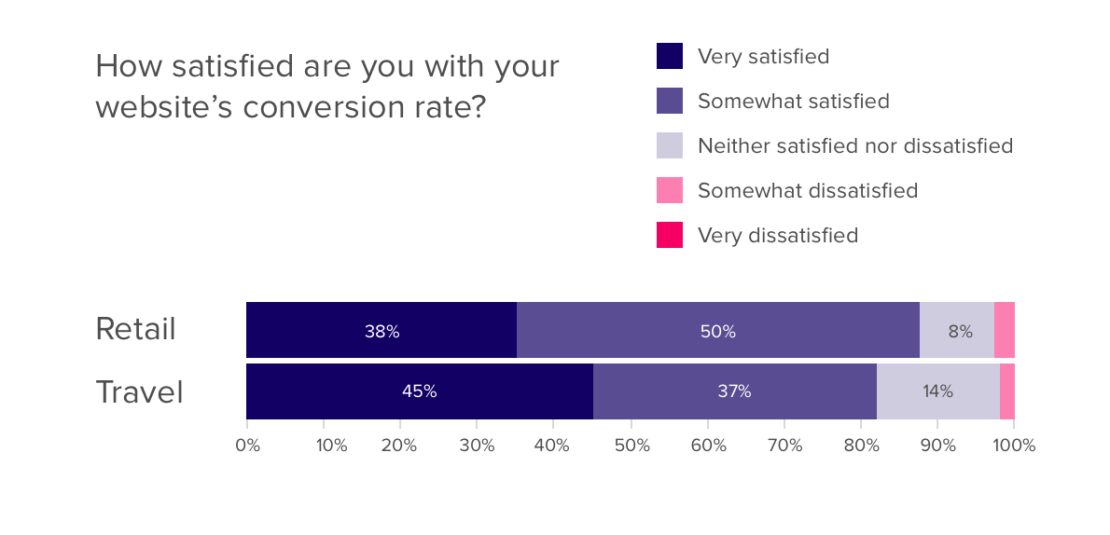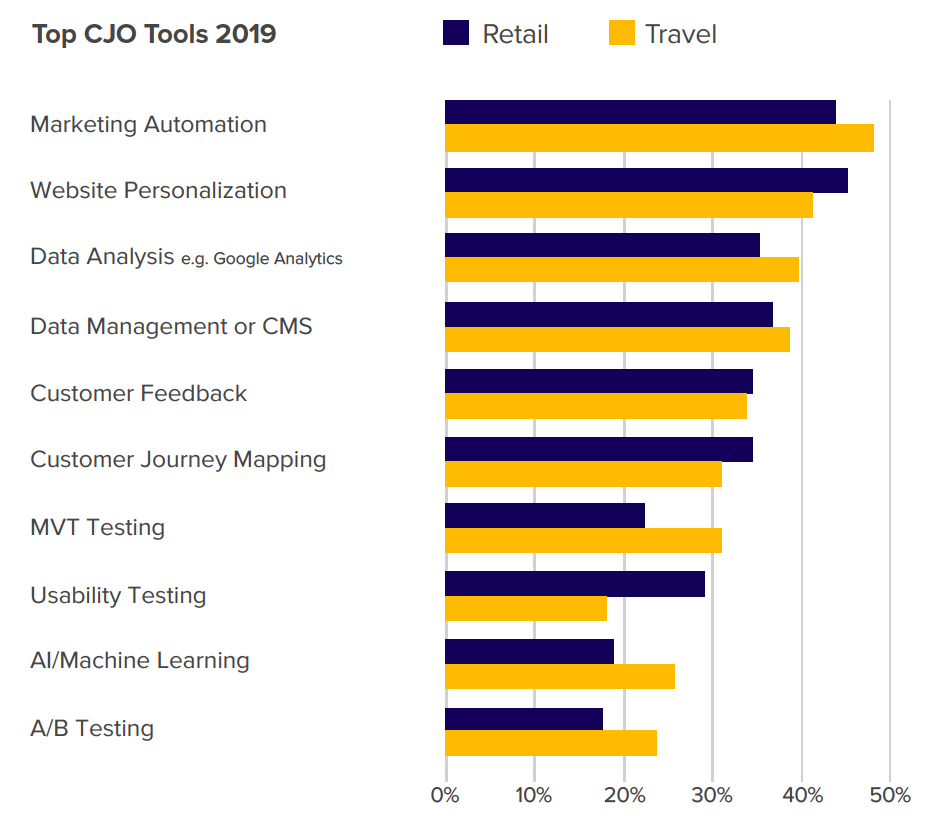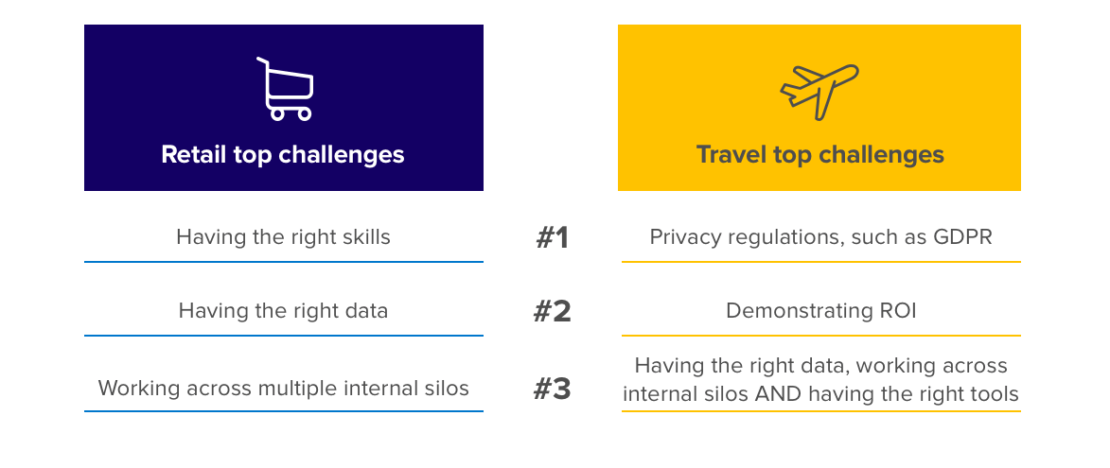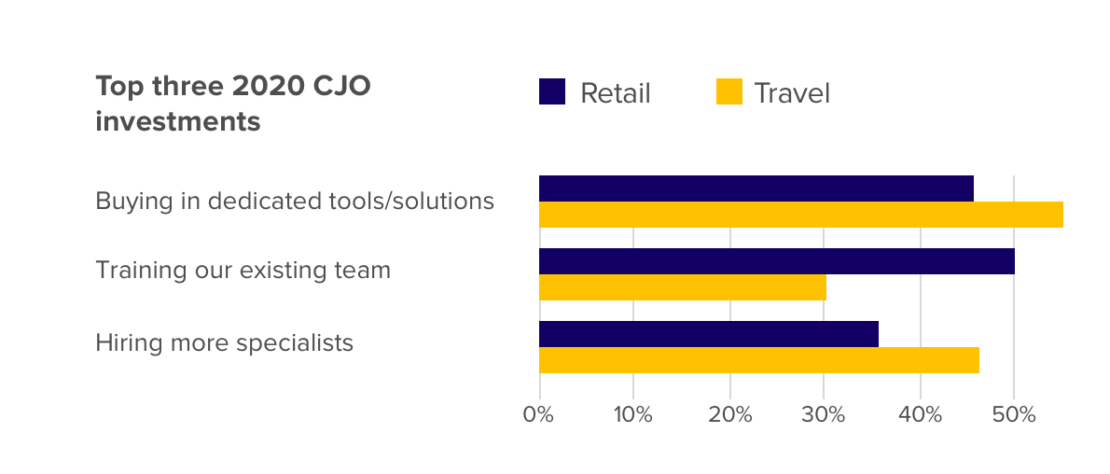BLOG
Travel Customer Journeys 2020
Published: Nov 12, 2019
How have marketers been optimizing the travel customer journey in 2019, and what’s in store for 2020?
Our second annual State of Customer Journey Optimization report, published last month, takes a look at how marketers are tackling customer journeys, and how these plans will evolve into 2020. For the first time, we split the data into segments, examining how different verticals (retail and travel) and markets (UK and US) are approaching things differently. In this first blog post in a series, we’re taking a look at what travel marketers have been up to.
The State of Travel Customer Journeys
One of the biggest takeaways from the report overall was that 2019 was really the year that marketers started to crack customer journeys. But can we say the same for travel marketers specifically? The travel customer journey after all is much different to retail, so we wanted to understand if this was reflected in their approach.
One of the first things that jumps out is that, yes, travel marketers are satisfied with their approach, but a little less so than retail, or the average. However, it is interesting to note that of those who are satisfied, Travel marketers are more likely to be ‘very satisfied’ compared to retail, with 45% ‘very satisfied’ with their conversion rate, for example, compared to 38% who said the same in retail.

Travel marketers were also more likely to be ‘very satisfied’ with their ability to action insights from the travel customer journey, with 44%, versus 36% in retail, or 39% overall.
Travel Customer Journey Tools
So if travel marketers are more likely to be ‘very satisfied’ with their efforts, it seems they are getting something right when it comes to the tools they are using. What are the top travel customer journey tools?
In 2019 the top three tools for travel marketers were Marketing Automation, Website Personalization and Data Analysis. The focus on marketing automation is one that we saw across the board, but Travel marketers are more likely to be using this tool, with nearly half (48.8%) versus 43% in retail, or 45% overall.

Travel’s other focuses fall in line with this trend toward automation – they are also much more likely to be using AI and Machine Learning. The other area of difference is testing – travel are more likely to be running MVT and A/B testing programs. This focus on testing and automating the travel customer journey perhaps explains the different levels of satisfaction we noted earlier in this blog.
Travel Customer Journey Challenges
So, we’ve got a pretty good idea of the current state of play, but what about heading into 2020? We wanted to understand the biggest challenges facing marketers, and how these have evolved over the last few years.
In travel, the top three challenges were privacy regulations (such as GDPR), demonstrating ROI and then followed by a few other concerns:

The travel industry’s issues with privacy regulations aligns with research released earlier this year that found travel was the industry most struggling to recover its databases one year on from GDPR. Compared to retail, 38% of travel marketers rated this as a challenge, versus just 26% retailers, and 31% overall.
The greater concern travel has with demonstrating ROI is perhaps due to the more complex nature of the customer journey versus something like retail, making tracking success difficult. Just 28% of retail marketers expressed ROI as a challenge, coming in at #6 overall, versus 36% in travel and the #2 spot.
Travel Customer Journeys 2020
So how will travel marketers overcome these customer journey challenges in 2020? We tool a look at where marketers plan to invest their budgets and the tools they plan to use. The biggest takeaway from this data is that CJO is now very firmly on the agenda – just 1% of Travel marketers have no plans to optimize the customer journey in 2020, down from 15% of marketers who said the same going into 2019.
Here’s what else they’ve got planned…

As we can see from the data above, Travel marketers are much more focused on investing further into technology and tools, while they’re also more likely to invest in external specialists. The specific tools travel marketers plan to invest in are Customer Feedback, Marketing Automation and Customer Journey Mapping, which broadly aligns with what we see overall.
What else will 2020 bring? Well, if 2019 was the year marketers began to crack CJO, 2020 could be the year they start to master it. Just 23% of travel marketers are doing more than 75% of what they’d ideally want to when it comes to the travel customer journey, meaning there’s lots of room for growth.
For the full report, featuring insights on the overall trends, UK and US markets and retail, click here!